
Idries Shah, also known as Idris Shah, né Sayed Idries el-Hashimi and by the pen name Arkon Daraul, was an Afghan author, thinker and teacher in the Sufi tradition. Shah wrote over three dozen books on topics ranging from psychology and spirituality to travelogues and culture studies.
Omar Ali-Shah was a prominent exponent of modern Naqshbandi Sufism. He wrote a number of books on the subject, and was head of a large number of Sufi groups, particularly in Latin America, Europe and Canada.

Sufi studies is a particular branch of comparative studies that uses the technical lexicon of the Islamic mystics, the Sufis, to exemplify the nature of its ideas; hence the frequent reference to Sufi Orders. It may be divided into two main branches, the orientalist/academic and the spiritual.
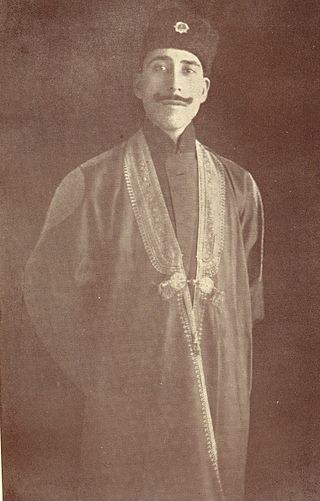
Sirdar Ikbal Ali Shah was an Indian-Afghan author and diplomat descended from the Sadaat of Paghman. Born and educated in India, he came to Britain as a young man to continue his education in Edinburgh, where he married a young Scotswoman.
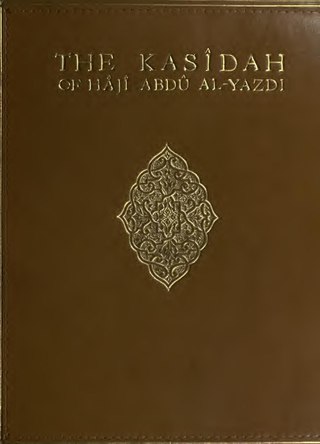
The Kasîdah of Hâjî Abdû El-Yezdî (1880) is a long English language poem written by "Hâjî Abdû El-Yezdî", a pseudonym of the true author, Sir Richard Francis Burton (1821-1890), a well-known British Arabist and explorer. In a note to the reader, Burton claims to be the translator of the poem, to which he gives the English title "Lay of the Higher Law." It is thus a pseudotranslation, pretending to have had an original Persian text, which never existed. The Kasidah is essentially a distillation of Sufi thought in the poetic idiom of that mystical tradition; Burton had hoped to bring Sufist ideas to the West.
Muhammad GhawthGwaliyari (1500–1562) was a 16th-century Sufi master of the Shattari order and Sufi saint, a musician, and the author of Jawahir-i Khams. The book mentioning the life and miracles of Gaus named " Heaven's witness" was written by Kugle.

Saira Elizabeth Luiza Shah was a Scottish writer who wrote under the pen name Morag Murray Abdullah. She met the Pashtun author, poet, diplomat, scholar, and savant Sirdar Ikbal Ali Shah and wrote about her marriage to this chieftain's son and her travels in the North-West Frontier Province of British India and the mountains of Afghanistan.

Amina Shah, later known as Amina Maxwell-Hudson, was a British anthologiser of Sufi stories and folk tales, and was for many years the Chairperson of the College of Storytellers. She was the sister of the Sufi writers Idries Shah and Omar Ali-Shah, and the daughter of Sirdar Ikbal Ali Shah and Saira Elizabeth Luiza Shah Scottish woman. Her nephew is the travel writer and documentary filmmaker Tahir Shah; her nieces, Safia Shah and the writer and documentary filmmaker Saira Shah.
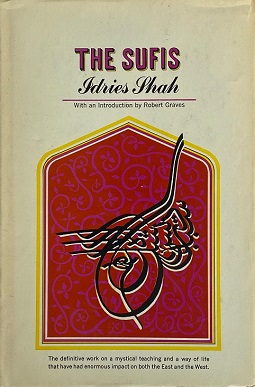
The Sufis is one of the best known books on Sufism by the writer Idries Shah. First published in 1964 with an introduction by Robert Graves, it introduced Sufi ideas to the West in a format acceptable to non-specialists at a time when the study of Sufism had largely become the reserve of Orientalists.
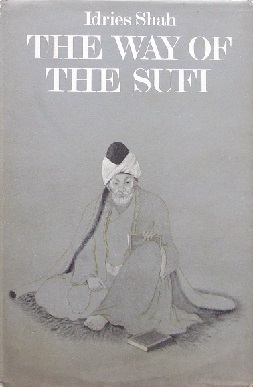
The Way of the Sufi was the best-selling follow-up introduction to Sufism by the writer Idries Shah after the publication of his first book on the subject, The Sufis. Whereas The Sufis eschewed academic norms such as footnotes and an index, The Way of the Sufi provided a full section of notes and a bibliography at the end of its first chapter, entitled "The Study of Sufism in the West".

The Commanding Self is a book by the writer Idries Shah first published by Octagon Press in 1994. A paperback edition was published in 1997.

Wisdom of the Idiots is a book of Sufi teaching stories by the writer Idries Shah first published by the Octagon Press in 1969. A paperback edition was published in 1991. ISF Publishing, sponsored by The Idries Shah Foundation, published a paperback edition on 2015, followed by the ebook version and audiobook.
Octagon Press was a cross-cultural publishing house based in London, UK. It was founded in 1960 by Sufi teacher, Idries Shah to establish the historical and cultural context for his ideas. The company ceased trading in 2014.

The Shattari or Shattariyya are members of a Sufi mystical tariqah that originated in Persia in the fifteenth century C.E. and developed, completed and codified in India. Later secondary branches were taken to Hejaz and Indonesia. The word Shattar, which means "lightning-quick", "speed", "rapidity", or "fast-goer" shows a system of spiritual practices that lead to a state of "completion", but the name derives from its founder, Sheikh Sirajuddin Abdullah Shattar.
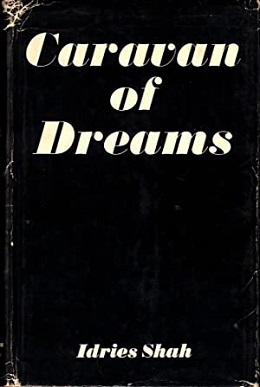
Caravan of Dreams is a book by Idries Shah first published in 1968 by Octagon Press as part of his presentation of traditional Eastern teachings and Sufi ideas for contemporary society. New editions of the book were published in 2015 by The Idries Shah Foundation.

The Elephant in the Dark is a book by the writer Idries Shah, based on lectures he delivered at the University of Geneva as Visiting Professor in 1972–1973. He was invited to speak on the topic of “Salvation as a total surrender to God: an attempt at dialogue between Christians and Muslims.”
The Idries Shah Foundation (ISF) is an independent educational and cultural charity, set up by the family of the late thinker, writer, and teacher in the Sufi mystical tradition, Idries Shah, who wrote over three dozen books on topics ranging from psychology and spirituality to travelogues and culture studies.

Sufism in Bangladesh is more or less similar to that in the whole Indian subcontinent. India, it is claimed, is one of the five great centers of Sufism, the other four being Persia, Baghdad, Syria, and North Africa. Sufi saints flourished in Hindustan (India) preaching the mystic teachings of Sufism that easily reached the common people, especially the spiritual truth seekers in India. Sufism in Bangladesh is also called pirism, after the pirs or teachers in the Sufi tradition.

The Pleasantries of the Incredible Mullah Nasrudin is a book by the writer Idries Shah, based on lectures he delivered at the University of Geneva as Visiting Professor in 1972–73. The book is a collection of tales, none more than two pages and almost all less than a page long, about the folkloric character Mulla Nasrudin. Published by Octagon Press in 1968, it was re-released in paperback, ebook and audiobook editions by The Idries Shah Foundation in 2015.
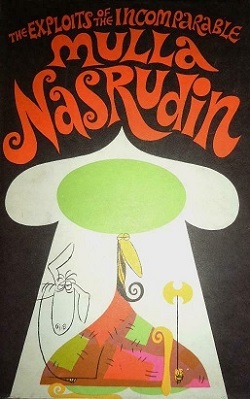
The Exploits of the Incomparable Mulla Nasrudin is a book by the writer Idries Shah, It consists of jokes and anecdotes involving the wise fool of Middle Eastern folklore, Mulla Nasrudin. Published by Octagon Press in 1966, the book was re-released in paperback, ebook and audiobook editions by The Idries Shah Foundation in 2014 and 2015.















